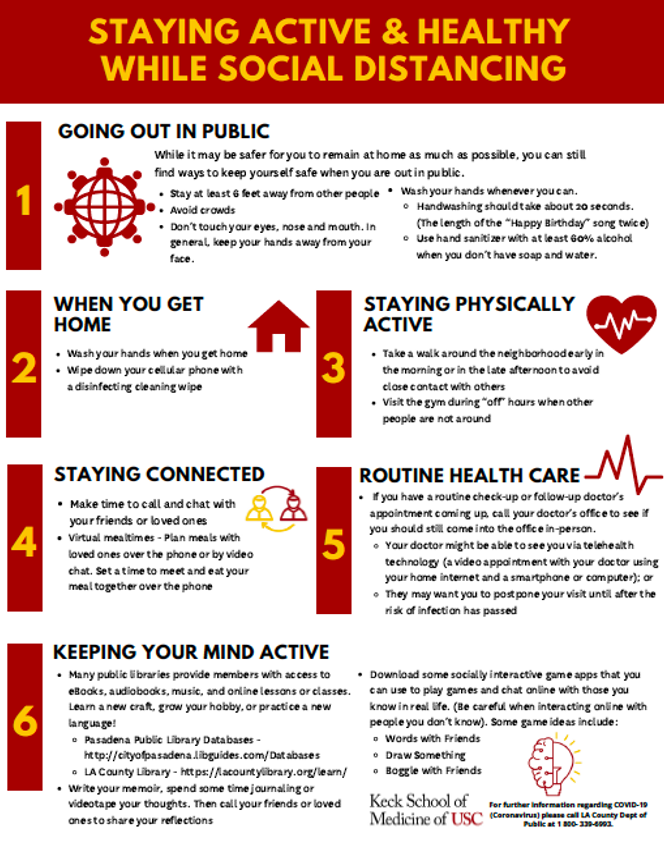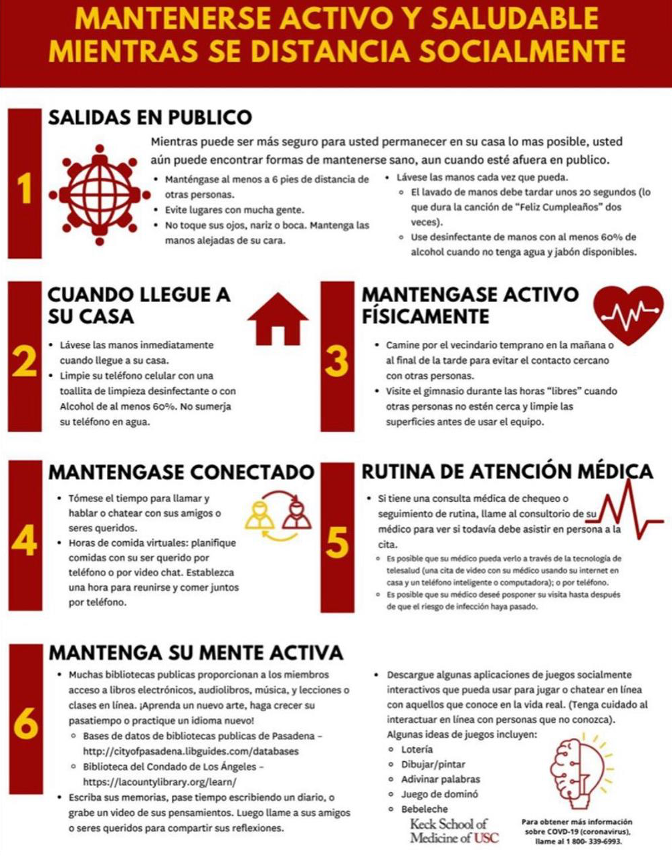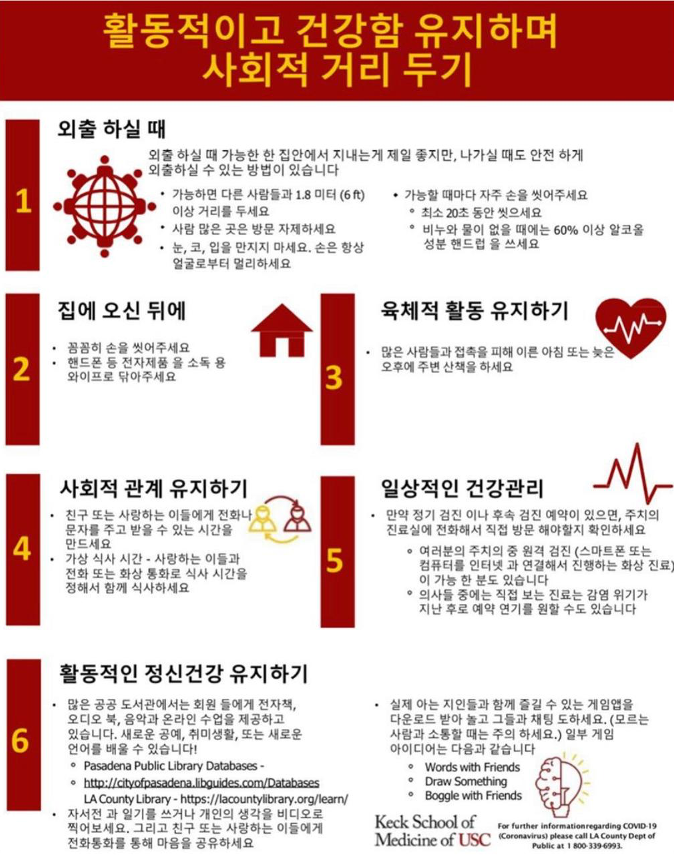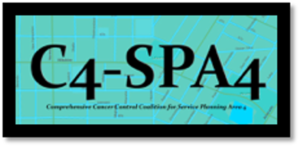USC Norris Comprehensive Cancer Center
An NCI-designated Comprehensive Cancer Center
Community Outreach and Education
Care for the Caregiver Children’s Tutoring Program Services
We have connected the families of 36 care workers with tutoring services provided by KSOM Medical Students on various topics, including science, math, English, and Spanish. Fourteen KSOM Medical Students have participated in these efforts. For more information, please contact Rosa Barahona at barahona@usc.edu.
LACDPH Educational Materials on COVID-19 and hand sanitizers distributed
To help disseminate information and fight the spread of COVID-19, the Office of Community Outreach and Engagement (COE) distributed 4,000 packets of educational materials in 12 different languages and 3,000 hand sanitizers to parents, community organizations/agencies, and neighborhood council meetings in four areas of the Eastern part of Los Angeles, multiple childcare services, retailers, senior centers, and local schools.
COE also developed specialized materials (developed by Laura Mosqueda, MD) for seniors and their families, which were distributed to over 400 community partners. For more information, please contact Rosa Barahona at barahona@usc.edu.



IMPACT Program - Alleviating Financial Toxicity for participation in Clinical Trials
The IMPACT (Improving Patient Access to Cancer Clinical Trials) program has been ongoing at the LAC+USC Oncology out-patient clinic for almost 6 years. This program seeks to increase cancer clinical trial enrollment, retention, minority participation, and equitable access to clinical trials.
The program focuses on removing financial barriers to clinical trial participation for cancer patients and improving access to cancer clinical trials for under-served populations. Patients are provided with educational materials with general information about clinical trials and the importance of participating. An on-site coordinator is available to provide details about the program and provide one-on-one education and assistance with applying and follow-up questions. Although COVID-19 has prevented many patients from coming to LAC+USC, efforts for payments to reduce financial toxicity have continued by phone, email, or online platforms. To contact the IMPACT program, reach out to Elena Nieves at elena.nieves@med.usc.edu.
USC/Unihealth Comprehensive Cancer Control Coalition for Service Provider Area 4 (also known as C4-SPA4 Promotores Outreach Program)
Since July 2016, the Promotores contra el Cáncer (community health workers against cancer) program has been serving the communities of Los Angeles County Service Planning Area 4 (primarily focused on El Sereno, Lincoln Heights, Boyle Heights, Highland Park, downtown Los Angeles, Mid-City and other vicinities). Funded by the Unihealth Foundation and in partnership with Clinica Oscar Romero, USC Norris-trained community health workers work to offer free educational information on basic cancer topics to approximately 600 residents and parents of the local K-12 schools.
Additionally, they have hosted booths in local health fairs to further inform the community on various resources, cancer screenings, and participatory-research studies available to the community. Moreover, USC Norris and LAC+USC affiliated clinics, as well as our Norris Cancer Promoters, refer community members for cancer screenings and to the Ronnie Lippin Cancer Support and Navigation Program for follow-up and guidance. Furthermore, they have also presented at major local and national conferences, and participate in our partners’ community related activities, such as cancer walks, toy drives, holiday toy giveaways, distribution of food, school supplies, and health education materials.
For the past few months and during the pandemic, we have been hosting monthly meetings for the C4-SPA4 collaborative task force group, formed by representatives of several USC departments, local hospitals and clinics. In these meetings, members exchange concerns and best practices that can benefit the patients and families we all serve. In addition, we are working on a tool that will be able to help more cancer promoters do their work and it will also be donated to providers and clinics in the SPA4 area.
For more information regarding this program, please contact Rosa Barahona at barahona@usc.edu.

Adolescents and Young Adult (AYA) Cancer Program
The Adolescent and Young Adult Program was established in 2013. It represents a collaboration between the USC Norris Comprehensive Cancer Center, USC Norris Cancer Hospital, Children’s Hospital Los Angeles, and Los Angeles County Hospital. The program is based on a joint medical leadership model by USC leaders in pediatric and adult oncology, in a major academic medical center and as part of an NIH- funded Comprehensive Cancer Center.
Our mission is to improve health outcomes and quality of life for adolescents and young adults with cancer through supportive care and research that address the medical, physical, psychosocial, spiritual, financial, and legal aspects of these patients; to promote awareness of AYA oncology among healthcare providers and collaborate to deliver an efficient and effective model of care; and to establish a dynamic AYA cancer peer support community in Southern California and beyond through psychosocial support, advocacy, education, community outreach, and partnership. To learn more, go to: https://aya.usc.edu.
Community Cancer Conference
The first bilingual Community Cancer Conference on Innovative Research and Precision Oncology Treatments was held at the USC Norris Comprehensive Cancer Center in Los Angeles on November 9th, 2019. The conference was organized by a collaboration between the Tower Cancer Research Foundation, The Lippin Family, Lazarex Cancer Foundation, the USC Norris Office of Community Outreach and Engagement, the Office of Training and Education, and the Florida-California Cancer Research, Education & Engagement (CaRE2) Health Equity Center.
A series of community partners supported the effort. Dr. Caryn Lerman, Director of USC Norris, made a welcome focusing on precision medicine and under-represented minorities in cancer research, followed by panels and presentations from prominent professionals and cancer survivors. During this inaugural conference, COE gave the first Annual Trojan Partnership Award; the first recipients of this distinction were Tower Cancer Research Foundation and the Lippin Family for their contributions to supporting the underserved patient community in Los Angeles. This conference will occur annually.
For more information, please contact Dr. Carolina Aristizabal at caristiz@usc.edu.
The Prostate Cancer Advocacy Training Program
A prostate cancer advocacy training program was developed, adapted, and culturally tailored for patient advocates and community health workers using language specific content on prostate cancer cause, risk factors, epidemiology, detection, diagnosis, and treatment. This training program was delivered by Florida-California Cancer Research, Education & Engagement CaRE2 research scientists and simultaneously broadcasted during two interactive webinars in Spanish in Los Angeles County and in English in Tallahassee, Florida.
Participants were able to choose which webinar (Spanish or English language) they wanted to attend. Participants were also given a prostate cancer advocacy “toolkit” to be used as needed in the community. The toolkit contained prostate cancer educational materials such as brochures, handbooks, and handouts regarding participation in cancer research and clinical trials as well as a resource directory for referrals.
During the training, the participants received education from an experienced cancer advocate on how to use the materials in the prostate cancer toolkit. To access this toolkit, click HERE. For more information regarding these trainings, please contact Dr. Carolina Aristizabal at caristiz@usc.edu.
The National Outreach Network Community Health Educator (NON-CHE) Program
The NON-CHE program at USC Norris focuses on two areas:
1. Increasing Human Papilloma Virus (HPV) infection awareness and vaccination rates
2. Increasing knowledge and Clinical Trial (CT) participation
